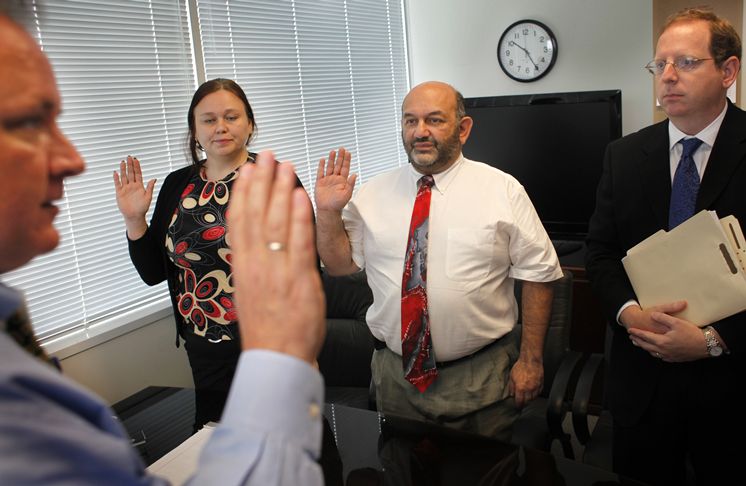
Securing your green card without attending an I-751 interview is possible, and understanding how to achieve this can save you time and stress. No couple wants to visit U.S. Citizenship and Immigration Services (USCIS) to be prodded with personal questions about their marriage. What’s more, the stakes are high. If USCIS isn’t convinced that you have a bona fide marriage, the conditional resident’s status may be in jeopardy. This article provides essential tips to improve your chances of avoiding the I-751 interview, streamline your application process, and ensure your petition for removing conditions on your green card is successful.
USCIS Determines the Need for an I-751 Interview
As a matter of law (INA §216.4) a couple must appear for a personal interview in order for USCIS to remove the conditions on residence. But if USCIS is thoroughly satisfied that you did not marry for the purpose of evading the immigration laws, they may waive the interview and approve the I-751 petition. Let’s help you avoid the I-751 interview all together.
The USCIS Policy Manual provides guidance to USCIS officers on when to consider waiving the interview requirement for Form I-751, Petition to Remove Conditions on Residence. USCIS officers may consider waiving an interview if they are satisfied that:
- The officer considers they can make a decision on the petition based on the record because the record contains sufficient evidence about the bona fides of the marriage and that the marriage was not entered into for the purpose of evading the immigration laws of the United States;
- There is sufficient evidence in the record of the conditional resident's eligibility for waiver of the joint filing requirement, if applicable;
- There is no indication of fraud or misrepresentation on the Form I-751, in the supporting documentation, or elsewhere in the record;
- There are no complex facts or issues that require an interview or sworn statement to resolve questions or concerns; and
- There are no criminal bars rendering the conditional resident removable.
Service Center Review
Initially, a USCIS Service Center will review your I-751 petition. If fully satisfied that the marriage was not for the purpose of evading the immigration laws, the Service Center may waive the interview and approve the petition. However, if they determine an interview is necessary, the case is sent to the Service Center’s Adjudications Unit and given to an adjudicator to assign a fraud level. Subsequently, they assign a fraud level of A, B, or C to your case. The adjudicator uses documentation you submitted with the I-751 petition to make this determination.
Risk Level Assigned
Although USCIS updated their procedures in 2022, we believe they use a protocol similar to the one outlined below. If the adjudicator is fully satisfied that the case can be approved, they may assigned a risk level of C. However, if the adjudicator is less than fully satisfied, but still feels that (based on the information available at the time) the case can be approved, then a risk level of B is assigned. Finally, if the adjudicator has serious concerns about the approvability of the case and/or wants the applicant and the spouse to be interviewed, then the case would be assigned a risk level of A.
Reasons for Assigning Risk Level C
If assigned a risklevel C, it means that there are no technical problems (signatures, missing information, lack of evidence, etc.) and the USCIS adjudicator thinks the case can be approved (no interview necessary). All required supporting documents are attached and there is no indication of fraud or misrepresentation that can be identified in the documents or through the biographic data of the parties involved.
Reasons for Assigning Risk Level B
Risk level B cases have no technical problems that need correction and have the minimum number of proper supporting documents, but there is something, or an absence of something that creates suspicion about the bona fides of the marriage, the veracity of the evidence, etc. The reasons for suspicion are so varied that a concise list cannot be made. An example would be where the I-751 is supported by the minimum required number of documents, however the documents are all of recent origin.
Reasons for Assigning Risk Level A
USCIS may assign risk level A when the adjudicator strongly suspects fraud. Reasons USCIS might assign level A include:
- The petitioner fails to sign the form;
- There is insufficient evidence;
- A large age difference exists between the spouses;
- The married couple is not living together;
- A prior I-751 was denied;
- The petition was filed untimely without a good reason for being late; or
- Any other reasons as the service center director may determine.
Once USCIS determines the risk level, they send the case to the field office in your area. The field office assigns a percentage to each risk level. USCIS will interview all level A cases. The field office may choose to interview between 30 and 100 percent of all level B cases; and between 10 and 50 percent of all level C cases.
In summary, this means that a very well-prepared I-751 petition will likely avoid the I-751 interview. But the field office may randomly select even some strong cases for an interview.
How Conditional Residents Can Avoid the Interview
USCIS determines the need for an I-751 interview, and USCIS has discretion to waive the interview. But there are things you can do to greatly improve your chances of avoiding it.
File a Well-Prepared I-751 Petition Package
Remember, the purpose of conditional residence is to prove that you entered marriage with the genuine intent to stay married together. If there is insufficient evidence to prove a bona fide marriage or there are circumstances that raise questions about your marriage, USCIS is more likely to schedule the interview.
In fact, USCIS may even approve waiver cases (petitions not filing jointly) without an interview when they are accompanied by sufficient supporting documentation to establish the bona fides of the marriage. Keep in mind, waiver cases are more complex and require additional documentation to establish eligibility for the requested waiver. CitizenPath recommends that you speak to an attorney before filing Form I-751 with a waiver.
CitizenPath simplifies the I-751 petition process with easy, step-by-step guidance and personalized instructions. Our affordable platform helps you ensure all necessary forms, documents, and evidence are correctly assembled, reducing the risk of errors and delays. Designed by attorneys, you can trust CitizenPath to help you prepare a strong, accurate I-751 petition package with confidence. Learn more about the Removal of Conditions Petition Package.
Submit Strong Evidence of a Bona Fide Marriage
Next, gather evidence indicating that the marriage upon which you were granted conditional status was entered in “good faith” and was not for the purpose of circumventing immigration laws. Submit copies of as many documents as you can to establish this fact and to demonstrate the circumstances of the relationship from the date of marriage to the present date, and to demonstrate any circumstances surrounding the end of the relationship, if it has ended. CitizenPath's filing instructions include a checklist of supporting documents to help you prove your bona fide marriage.
As you can see, your best strategy to avoid an I 751 interview is to prepare a strong I-751 petition with overwhelming evidence to prove a good faith marriage. You want the USCIS Service Center to quickly approve your petition instead of forwarding it to the field office.
How to Prepare for the I-751 Interview
This article assumes that you filed the I-751 petition jointly with your spouse and you continue to remain a married couple. If you filed I-751 petition with a waiver (for any reason) or filed jointly and have since split up, CitizenPath recommends that you contact an experienced immigration attorney before attending the I-751 interview. These cases are more complex and require special consideration and strategy from a legal expert.
Nonetheless, there are some best practices when preparing for the I-751 interview:
Gather Supporting Evidence of Your Good Faith Marriage
If you prepared a strong I-751 petition to prove a good faith marriage when you originally filed, you should have kept a copy of these documents. Shared bank accounts, shared financial responsibilities, travel records, wedding records, and children born into the marriage help support your bona fide marriage. If you have new evidence, take it to the interview (in case you need it).
Dress Formally
Formal dress communicates that you take the interview seriously. Dress as if you are going to church or a job interview.
Arrive Early to the I-751 Interview
Get to the interview location at least 15 minutes earlier than the scheduled time. Avoid rescheduling the interview unless it is absolutely necessary.
Be Honest and Open about your Relationship
The USCIS officer will likely ask questions about how you spend your lives together. For example, the officer may ask you how you celebrated a spouse’s birthday, what foods they enjoy, and what your spouse’s friends are like.
The I-751 interview will likely dive into some very personal issues about your marriage. If you are a private person, or if you are from a cultural background where talking about relationship issues is somewhat taboo, you may want to prepare yourself by talking to a friend or relative. Although this is not a complete list, and some of the subjects may not be covered at all, here is a list of some topics that you should be prepared to discuss:- How and where you met your spouse
- Your relationship with your spouse’s family
- The length of your courtship
- How you spend time together
If your I-751 petition package did not include sufficient evidence of shared financial and/or insurance records, you should expect USCIS to ask why. If the couple doesn’t live together, USCIS will want to know more. In many cases, couples have very reasonable explanations.
As long as you are honest throughout the process, you’ll have no problem answering the interviewer’s questions.
Stokes Interview
Couples that sufficiently document their bona fide marriage will avoid the I-751 interview or pass the initial interview. However, USCIS may schedule a “Stokes interview” when there is some concern about the legitimacy of the marriage. That’s why this meeting is also known as a marriage fraud interview.
This is also a second chance for the couple to convince the USCIS officer that the marriage is genuine. The Stokes interview is serious business. The appointment may last most of the day. USCIS will typically separate the spouses question them individually. The USCIS officer will compare answers and provide further questioning for discrepancies.
The petitioners’ inability to demonstrate the marriage’s authenticity could result in a denial of Form I-751. This leads to removal proceedings for the foreign spouse. If USCIS schedules you for a Stokes interview, we recommend that you work with an immigration attorney to develop a strategy and prepare for the appointment.
Improve Your Chances of Skipping the Interview
CitizenPath provides simple, affordable, step-by-step guidance through USCIS immigration applications. Individuals, attorneys and non-profits use the service on desktop or mobile device to prepare immigration forms accurately, avoiding costly delays. CitizenPath allows users to try the service for free and provides a 100% money-back guarantee that USCIS will approve the application or petition. We provide support for the Removal of Conditions Petition Package (Form I-751), Naturalization Application Package (Form N-400), and several other immigration services.
Want more immigration tips and how-to information for your family?
Sign up for CitizenPath’s FREE immigration newsletter and
SAVE 10%
on our immigration services






